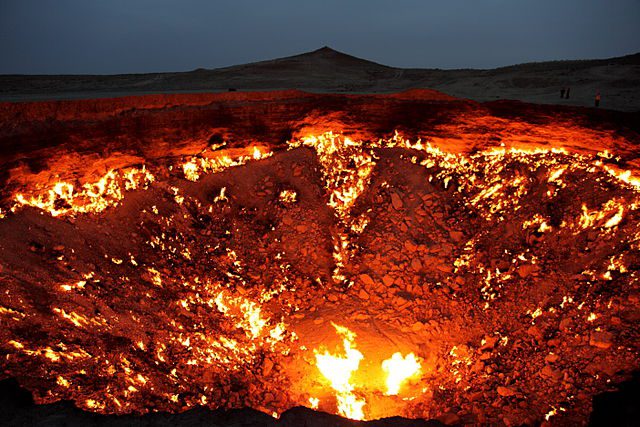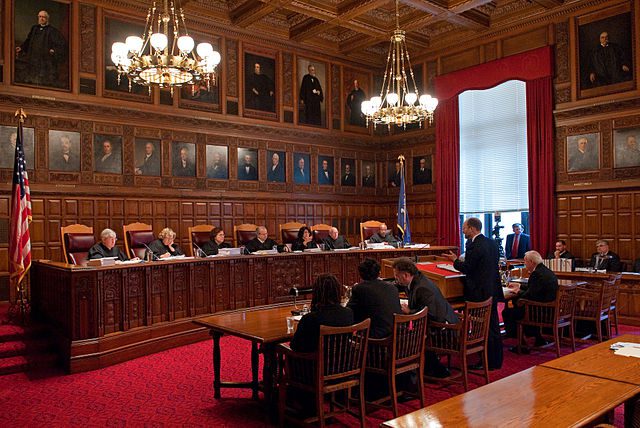
The following is a response to a person who is sincerely seeking to understand Catholic teaching on hell. He is “currently completing a PhD on the philosophy of Aristotle”: so one can see that it is quite a challenge to me to answer his inquiring objections. His words will be in blue.
* * * * *
I believe good, honest, sincere questions deserve a good answer, so I will offer mine, and hope that it is an aid to you as you work through the issue and come to a decision about Catholicism one way or the other.
I took about eight courses in philosophy in college and have always loved it. I delve into some philosophical theology now and then in the course of doing apologetics, and love to apply the socratic method in my own debates.
[There] are certain basic Catholic doctrines which I find it impossible to reconcile with the dictates of my conscience. I am hoping that somebody on this forum will be able to help me to find clarity regarding some of the issues troubling me.
I hope so too. I admire your evidently sincere search for truth in these matters. You show yourself a true philosopher, in the best meaning of the word.
I want to make it very clear that my expression of disagreement with certain Catholic positions, as I understand them, is not intended to be polemical. I am deeply struggling with the question of conversion. What I am looking for is clarification, which will hopefully make it possible to reconcile my conscience with the Church’s teachings, thus removing the obstacles to conversion.
That’s what the apologist tries to do: the very heart of our endeavor: to remove obstacles and roadblocks that hold people back, in good faith.
I know that on some issues my own convictions differ from the teachings of the Church. What I am hoping for is a statement of the Church’s position on the issues I mention, but a statement which responds to the concerns I have, in a way which helps me to see why I am wrong ( if that is the case) and why the official Catholic position is not subject to the problems I mention.
I’ll do my best. I suspect that, given your education, some of what you seek will probably have to come from fellow philosophers who are Catholic (or otherwise Christians if it involves doctrines that are agreed), but I think I can offer you something to ponder. Just take from my replies whatever you think is useful to you.
My first and foremost problem is with the doctrine of Hell. I realise that this is not exclusive to Catholicism, but I am interested in the Catholic perspective on this. I have tried since I first grappled with the idea at 17, to find some way of reconciling this doctrine with my understanding of God and morality and I have been unable to. I have spoken with many Christians, both Catholic and Orthodox, and nothing they have said has made the doctrine acceptable to me. I consider this to be a question of fundamental importance in so far as a conception of hell implies a certain understanding of God. I cannot relate to this doctrine purely intellectually. It offends me at some fundamental level, since it seems to me to be a calumny against God. So you might be wondering what exactly my problem with hell is, and what kind of conceptions I reject.
I definitely would, in order to answer properly. Objections to hell generally fall into relatively few general categories. But there are lots of particular variations. To give a solid answer, I would need to know with great specificity what your objections are. That may very require a few back-and-forths. If it becomes inappropriate here at a certain point, I’d be more than happy to continue such a discussion on my blog.
Let me try to give you a brief statement of my views.
Good!
Firstly, I am not talking simply about the conception of hell which sees its punishments as essentially retributive. The view that God actively punishes the damned is to me so morally abhorrent, indeed blasphemous, that I have never been able to even consider it as a real possibility.
Well, it seems that you have a very strong emotional reaction to your conception of the Christian doctrine of hell. I think, oftentimes, we project onto God thoughts of our own, as if hell reduces to some kind of petty revenge on God’s part or His desire to exercise a sort of sadistic power to torture people who disagree with Him. I don’t think any of this is true. I wrote in one of my debates with an agnostic:
Those who go to hell do so in their own free will, by their own free choice, having rejected the God Whose existence and nature is “clearly seen” by all (Romans 1). For the life of me, I don’t understand why this should be so objectionable: God allows free creatures to reject Him and even spend eternity without Him if they so desire. Would you rather have Him force you to go to heaven rather than give you the freedom to freely choose heaven or hell as your ultimate destination? In any event, the existence of hell is no proof whatsoever that God is evil. It proves (almost more than anything else) that men are free.
In my main defense of the Christian doctrine of hell, I stated:
The essence of hell is separation from God. God in effect says: “so you want to live apart from Me? You think that is a preferable state of affairs to living with Me? Very well, then, go ahead; see how you like it.” Of course, God would have a great deal more love and compassion than that (I’m applying human emotions to Him — a sort of anthropomorphism in reverse), but this is the basic idea. The Bible talks about God giving men up to their own devices and the hardening of their hearts (the same sort of notion).
C. S. Lewis stated that “the doors of hell are locked from the inside.” God respects human free will so much that He is willing to let men reject Him and spend eternity away from Him, if that is their choice. Of course, those who choose this don’t have the faintest idea of what an existence utterly without God is like, because they have not yet experienced it. This is the tragic folly of the whole thing.
The instant they do experience it, they’ll know what a terrible mistake they made, and in my speculative opinion that will be the primary horror of hell: the intense, irreversible self-loathing, self-hatred, and regret at having made such a stupid and perfectly avoidable mistake as to end up in an unspeakably dreadful, hideous place or state like hell. We know from this life how difficult it is to live with bitter regret: the mulling over the “if only’s” of life and our bittersweet journey through it.
Imagine doing that for eternity! And, of course, this is one big reason why Christians want to proclaim the gospel, so people can avoid that miserable fate, and can live eternally the way God intended them to live, without suffering and sin: complete, whole, perfect creatures, rejoicing in God’s wonderful presence forever.
If this is indeed the official doctrine of the Catholic Church then any possibility of my finding my home there is ruled out. I hope, and my conversations with a number of intelligent Catholics has given me reason to hope, that this is not in fact the case, and that enlightened theological opinion rejects this view. In my conversations and reading I have come across the view, supposedly quite influential, that the punishments of hell are not inflicted by God, so much as a necessary result of the post-mortem state of the soul of someone who has cut himself off from God. This seems to me far superior to the former view.
I think this may be another way of expressing what Lewis meant by saying that the doors of hell are locked on the inside. It’s not that God forces people to follow Him, but that they don’t want to follow Him, because of, often, misconceptions about what it means to follow God as a disciple.
But even here I find grave problems. Essentially I cannot accept the view that hell, even on this conception, is eternal, that once in hell it is impossible to leave it, and that the soul is, after death, fixed in its orientation and unable to make spiritual progress.
Why would this be inconceivable to you? There is a temporal and a timeless existence. Once we die we enter into a timeless eternity, which cannot be other than what it is. Therefore, once we grant that there are moral distinctions to be made in this life, between good and evil, and we grant that there is a good God, it seems rather straightforward that the concept of divine justice would make it absolutely necessary for there to be a rather definite and compelling cosmic justice and weighing of the facts of what a person has done and believed in this life.
The necessity of judgment is apparent from the human analogy of laws and judges. When we do bad things, there are consequences. And often, they are irreversible. If we murder a person, they are gone from the earth forever. The act had a consequence that to us, from the earthly, temporal perspective, is final. If we get drunk and ride a motorcycle and crash and have to lose an arm or leg or suffer brain damage, those things are irreversible. The dumb behavior had definite consequences. A price had to be paid. This is simply reality. By analogy, if (as I would strongly contend) the dumbest thing a person can do is reject and disbelieve in God, or in His goodness and mercy, then we would expect that there would be some extremely severe consequences to this in the long run.
Since souls are eternal by nature, that consequence is an unending place or state that is separate from God, that we have no remote conception of now: how horrible it is. And to end in hell is entirely our fault, not God’s. So why would anyone in effect “try God” for the existence of hell, since no one ever had to go there in the first place? It’s like blaming a judge who gives the sentence, for the existence of a penitentiary. Does that make any sense? Yet this is essentially what you have done by finding hell objectionable and somehow a thing that casts aspersions upon God’s character.
God the Father has provided a way for any man to be saved who desires to. He has made the way of salvation available through the death of His Son Jesus, Who is in fact God, and the second Person of the Holy Trinity. Catholicism isn’t Calvinism, inasmuch as it doesn’t teach that God predestines people to hell. I think that view (double predestination) does indeed lay God open to the charge of cruelty and arbitrariness and injustice. But that is their argument: let them defend it. It’s not our burden.
Catholicism and Arminian Protestantism and Orthodoxy (which constitute the vast majority of Christians now and at all times throughout Christian history) reject this. And that may constitute part of your objection. When it is seen that people choose hell of their own free will and that God allows them to go there if they insist, that takes the “blame” off of God, in my opinion. There is a strong sense in which it is absurd to even blame God for it, just as men habitually blame God for every evil: including ones that are the fault of man altogether (things like the Holocaust or unjust laws or wars).
Even on the more moderate view that the punishments of hell are a consequence of alienation from God, not of God’s active punishment, it makes no sense to me that they could be eternal.
But you have to step back and ask yourself several things that you have assumed as premises before you even get to this point: “on what basis do I find an eternal state apart from God nonsensical or implausible or impossible?” Your presuppositions entail a necessary examination of anthropology: i.e., from the theological perspective: what is man? Of what does he consist? Does he have a soul; what is that, and is it temporal or dies it have no end? Is there such a thing as sin? If so, how does God judge it and what are its consequences? Is there such a thing as original sin or the Fall, sufficiently serious enough in its rebelliousness and wrongdoing to require in the nature of things justice and punishment from the God against whom we have rebelled? Is this corporate, and involving the whole human race (as the Bible clearly teaches)?
On what possible basis can one conclude that an eternal existence apart from God, of creatures who have expressly rejected this God, is an a priori impossible or unjust or implausible state of affairs? To me it’s rather simple: we are creatures who will exist from this point into the future. We will never have an end to our existence. We’re like a ray in geometry: with a beginning but no end. We can be with God in eternity after we die or without Him. The choice is ours. No one has to go to hell if they will simply believe in God and follow Him, enabled by His grace to do so. These things are essentially matters of faith, part of revelation. But they are also able to be defended by many analogies to human experience and felt internal conceptions of morality and justice.
If they were, any purpose or value that they might have would be totally removed. It would simply be purposeless suffering without end.
I reject your premises and fail to see why a timeless state apart from God (hell) reduces to a situation where, thereby, no “purpose” or “value” is present. The purpose is a combination of “cosmic justice” and the determination of God to permit human free will even where it entails a rejection of Him and eternal misery. Human beings are given an adequate chance to avoid all that. The choice is theirs. But to say that timelessness in and of itself wipes out all purpose makes no sense. One has to first establish that there is no such thing as atemporality. Even the laws of physics after Einstein make that rather difficult to do. Therefore, if there is an existence outside of time or beyond time or in other dimensions, then those who have chosen certain paths will be present in this state either happily or unhappily, just as they live on this state in basically one condition or the other, in the deepest depths of their heart and soul.
To me a God Who would countenance the existence of such suffering would be not much better than one who actively punished sinners. When I have brought these thoughts up with Catholic friends, they have usually responded by saying that hell is a necessary consequence of free will, and that God respects human choice even if this is the choice of eternal separation from God.
Okay; let’s play along with that, then. We can pursue several alternative choices:
1) God chooses to annihilate people rather than their being eternal creatures (i.e., relatively from the time of their origination, not absolutely, like God, Who has no beginning or end).
2) God chooses to annihilate the ones who aren’t worthy of salvation (this is the Jehovah’s Witness and Christadelphian belief).
3) God chooses to not judge anyone at all. The evil as well as the good all end up the same. There is no “cosmic justice.”
4) God saves everyone.
5) God predestines all to hell no matter what they do or believe. (the flip side of #3).
Now, let’s examine each, and see if they make more sense than an eternal hellfire (and heaven).
Reply to Option 1: Here one argues from the existence of things that cannot be otherwise. We can comprehend many such things. The laws of non-contradiction and of geometry or mathematics are two such things. Can we really imagine any possible universe in which one can exist and not exist at the same time, or in which a square is a circle or a line is a triangle? No. Can we imagine a universe with no spatial characteristics at all, even one in which there was no matter? We can easily comprehend a possible universe that is entirely non-material or pure spirit, with no matter, but we can’t comprehend either a completely dimensionless universe or a state of affairs where nothing whatever existed, even space.
Therefore, by the analogy of things such as the above that cannot be otherwise, we reason, based in part on the revelation about the existence of both eternity and souls, that souls, too, are included in the class of things that cannot be otherwise: that they are what they are (in terms of duration) by nature. They are unending, just as a ray in geometry is unending. They simply keep going indefinitely, analogous to rays of light that will travel throughout the universe without end. We may not understand it, but is it inconceivable? No, not at all. I see nothing implausible or unreasonable at all in the notion. And if we accept this and also some law of justice that applies to all sentient beings with moral responsibility, then we arrive at the Christian notion of heaven and hell as final destination places or conditions.
Reply to Option 2: This is certainly possible, but it is contrary to biblical revelation, and it has the characteristic of “metaphysical asymmetry.” If saved souls live forever, then it would seem to follow that damned souls would also, not that they would be annihilated, because in both cases, human souls are involved, and souls have the characteristic of either being temporary or endless. So it would seem to make a lot more sense that either all souls are annihilated or none (in order to have one consistent definition of a soul), but not one class only.
Reply to Option 3: This would make the world a meaningless place, where there is no consequence to good or evil actions. That is far more horrible than the state of affairs in which good, saved people are eternally happy, and bad, damned ones eternally miserable. Instead, we can commit any evil whatever and not expect any undesirable consequences for our actions. That would make “god” worse than the worst person imaginable. He would become evil Himself, as well as a weakling and the furthest thing from omnipotent.
Reply to Option 4: This is also logically possible, but the problem is that it makes mincemeat of human free will and it makes moral behavior meaningless. And of course it is utterly contrary to biblical revelation, if a person believes in that by faith.
Reply to Option 5: Variation of #3 and subject to the same replies.
We conclude, then, that the Christian scenario of heaven and hell makes (philosophically) far more sense (considered apart from revelation) than any of the alternatives.
Really, the issue for me has less to do with human choice and more to do with God.
But then you are discounting that we all make the choice to follow God or not. This contradicts your own introductory statements, that presuppose that you are making religious choices of your own free will (“I began my own path of questioning and eventually found my way back to Christianity, . . . I am currently struggling with the question of conversion to Catholicism”); indeed, this entire discussion would be meaningless if you have no free will to make such choices.
Even if we could choose hell,
What makes you think that we couldn’t or wouldn’t do so in the first place? This is the thing to ponder. Do you deny that there is such a thing as an atheist?
the more pertinent question is how could God countenance the existence of creatures condemned to eternal suffering.
Because God values free will more than a bunch of mindless, will-less, soulless robots that “love” Him. He wants us to enjoy the freedom of choice to do the good or the bad that He Himself possesses. God always chooses good. He can’t make us creatures that way without denying free will, but at least He can give us the freedom to do good and to believe truth.
That being the case, there must necessarily be a class of those who will exercise this free will wrongly and stupidly. How could it be otherwise?
What kind of God could countenance something like that?
The true God doesn’t countenance anything bad. I am contending that what you see as a “bad” thing is either misunderstood by you as to its actual nature, or isn’t the case, period. Not all suffering and bad choices of creatures can be blamed on God. If there is free will, then there is also moral responsibility of the ones who possess it. And that simply can’t be blamed on God. It’s a bum rap.
It does not seem enough to me to say that God would suffer knowing that there were souls in hell.
God has compassion on all souls. He can’t be otherwise. It’s because God is love.
I cannot see how God could refrain from actively working to lead those souls out of darkness, however long it took.
They have an entire lifetime, and (many believe) a chance right after death, too. The thing to ask here is why you have this notion that God must work eternally to redeem souls? He is under no such obligation. He only has to give every person an adequate chance to believe in Him or reject Him, and we believe as Christians, based on revelation, that He more than amply does that in this lifetime.
You are presupposing that what God does to redeem a stray soul is never enough, but then we’re back to blaming God again for the rebel, rather than placing the blame with the rebel, which is where it belongs. This makes no sense. We always want to blame God for everything. It’s a sort of “cosmic blame-shifting.” We never want to blame evil, rebellious man for anything. He’s always a poor, pitiful victim, and it’s always God, God, God Who is supposedly at fault for not having done enough. I would urge you to stop and consider (granting a good God’s existence) the gross unfairness of that endeavor and “spirit.”
To say that God respects a human beings choice of eternal suffering is to limit God’s love, His compassion, His wisdom.
How? I don’t see that this follows at all. God, in effect, is saying:
1) You will live forever.
2) You can choose to believe in Me.
3) Or you can choose to reject Me, because I have given you the dignity of having the free will to do so and to make intelligent choices.
4) Both choices have eternal consequences because your soul is eternal (#1).
5) If you believe in Me, you will have a wonderful existence in heaven with Me for eternity. You’ll have all your aspirations and dreams and deepest impulses and desires and longings completely fulfilled, beyond your wildest imaginings. You were created to serve Me, which is why you are happy and joyful and at peace only when you do that.
6) If you reject Me, you will suffer terribly. I love you and am trying to save you from that fate, and am giving you all the information from My revelation, and internal intuitions and knowledge, and the witness of other human beings and changed lives and miracles, and my enabling grace, to avoid this, But I will not deny your free will.
That’s the choice given, according to biblical revelation. Yet you want to say that such a state of affairs is unloving on God’s part? How? I swear that I don’t comprehend it. Do we blame a parent when he or she does absolutely everything that they should to adequately train and provide for a child, yet the child goes astray in the exercise of his or her free will? We all know people like this. Is it their fault (at least in terms of primary responsibility) or the child’s?
How is it at all unwise, either? God could either give us a free will or create us as robots Who followed His commands just like robots do ours. Would you rather be a robot? This very conversation would be meaningless. Once free will is granted, then it makes entire sense to speak of good and bad eternal destinations. Souls are eternal by nature, so the afterlife is eternal (or, I should say, timeless and unending) as well.
It is to say that evil can triumph against God, that God can be faced with an evil which He cannot overcome by means of what is most truly His, namely love, gentleness, compassion.
That’s correct. That is the nature of free will. How can God force a free agent to love Him? Then it would no longer be free will. He can’t do that, just as He can’t annihilate Himself or make a square circle. These are logical impossibilities, not limitations on His omnipotence, which means, “ability to do all that is logically possible to do.” This is the proper response for the problem of evil as well.
For who is to say that God will never find a way to lead a soul out of darkness without infringing on human freedom?
He can give a human being every way out of darkness but they have to follow, just as the horse has to drink the water after being led to it, and we can’t force it to do so.
So the argument that hell is a necessary consequence of free will seems to me to be unconvincing.
For the life of me, I don’t understand why. I never have. Perhaps you can explain to me why you find it to be so, so I can comprehend the objection.
There is no reason why God could not forgive sinners again and again and again, even after death, until they learn and are reconciled to him.
To the contrary, there is no reason why He should be required to exercise mercy indefinitely and not have a cut-off point. If indeed, all men have a more than adequate chance in this life to repent and follow God, then there is no reason whatever why God should have to extend this mercy indefinitely after death. He is under no “moral obligation” to extend mercy at all, let alone indefinitely.
Take the analogy to our legal system again. The judge says that a person can be paroled, given a few (not at all impossible) conditions. This is legal “mercy.” But the prisoner fails to abide by these, and so he doesn’t gain parole. Now, in your thinking, the one to blame for this is the parole officer or judge, because He didn’t exercise enough mercy and should have forgiven the prisoner an infinite amount of times for all his violations. In my thinking, the prisoner is at fault and the judge, not in the slightest, because he was exercising clemency and mercy and the prisoner in his stupidity failed to do the few things he had to do in order to receive this gracious gift.
This would in no way infringe on free will.
It certainly would because it renders free will itself ridiculous, insofar as any acts done with this free will have absolutely no consequences and errant or evil acts must be forgiven an infinite number of times. That makes mincemeat of the very notion of justice and morality as well, along with free will.
The idea that a human being could be rebellious to the bitter end may be possible in an abstract sense, but it seems to me thoroughly unrealistic.
We see it all the time. How is it unrealistic? We see many examples of evil people who never reform, even when given chances to do so. And that is because evil has the capacity to completely corrupt a soul. Your problem is that you are (as presupposed by your argument, if not consciously) soft-pedaling man’s evil and rebellion. It’s very common, because it is natural man’s natural response to being told that he is an evil rebel. We always raise ourselves higher than we are. We don’t see as God sees.
Assuming that God did provide for the possibility of purification after death, it is highly implausible to suggest that human sinfulness could win out in the end.
How so? The existence of any moral evil at all in the world, shows that evil men can “prevail” over God, because God allows evil to exist: because of free will.
One Catholic priest I spoke with stated that a Catholic is obliged to believe in Hell only as a logical possibility, necessarily arising from free-will.
He is wrong. Hell is a dogma of the Church and clearly taught in the Bible.
On this priest’s view, the Church has never definitively stated that any particular person is in hell.
That’s correct, but it doesn’t follow logically that there is no hell. There certainly is, according to the teaching of Jesus (Who talked about it even more than He did about heaven) and other teachings in the Bible.
More strongly still, this priest stated that strictly speaking a Catholic is not expected to believe that there is anyone in hell. In other words, while rejecting the very possibility of hell is heretical, it is acceptable to believe that hell is empty. Is this an accurate account of Catholic doctrine?
No. We can hope that any individual person will be saved in the end, but the Bible is clear that many people will be damned, and the place of the damned soul is hell. This is what we teach.
Let me say outright that I have no problem with the idea that we have to take responsibility for our actions and that sometimes the only way to correct error and to move forward is through suffering.
Then I think that some of my replies should carry some force with you, because they expand upon your own principles.
My own deeply considered belief is that after death, the soul, freed from some of the deep seated egocentrism of earthly life, and by the grace of God, will be able to see its earthly life with a clarity and comprehensiveness which was impossible earlier. We will see all our failings, all of the hurt we have caused others, the unknown consequences of our actions, and we will have to take responsibility for them, feel genuine contrition, and certainly, in all likelihood, suffer terrible pangs of conscience.
The Church has not ruled out a possible salvation right after death. We simply don’t know much about it, from revelation alone. But there is no concept of a “long” time after death or souls going from hell to heaven, etc. Those in purgatory are saved. it is inevitable that they will be in heaven in due course. That’s entirely different from the reprobate in hell.
I imagine also, that a soul excessively attached, one might say addicted, to earthly life, pleasure and so on, would also suffer “withdrawal symptoms” of a sort, as it accustomed itself to a new form of existence. In the case of somebody deeply mired in evil, I suppose those pains would be both terrible and prolonged.
That’s exactly why we Catholics believe in purgatory. It makes perfect sense. But as I just stated, those souls are saved already, not in the process of being saved. We are saved by Jesus Christ and God’s grace, not our works.
So, basically, the only conception of hell that makes sense to me is closer to the Catholic conception of Purgatory, as I understand it.
Good. But you have to allow for hell as well, for those who continue to reject God.
In other words, a period of post-mortem purification, whose duration and intensity depends on the individual. It is not retributive. If it is painful, the pains are not a punishment but the result of a conscience enlightened by God. Unlike the usual conception of hell, which seems to be based on the assumption that no spiritual progress is possible after death ( at least for the damned), my view would be that everybody can make progress, repent and be redeemed and that purification, however long and painful, must have an end.
On what basis do you believe such a thing? You actually want to deny that a person can achieve a state of being irreformably evil and opposed to God? Why would you think that?
I am certain that my views are incompatible with Catholic doctrine in so far as I am familiar with it.
You are correct.
I hope and pray that somebody will be able to clarify the Catholic position on this question in a way which will allow me to reconcile myself with the Church’s teachings.
I’ve given it my best shot (for an “introductory” reply, anyway). I eagerly look forward to further interaction. Perhaps I can persuade you! But it goes far beyond mere persuasion. It requires grace and faith to believe in all the things of the Catholic faith. If you are truly open to God, and willing to follow Him wherever He leads, He will give you this enabling grace to believe these things. And you will see (if you are persuaded) that they don’t cast doubt on God’s goodness or power or justice at all.
***
(originally 12-26-08)
Photo credit: Demon (Horror Fantasy), by Maxwell Hamilton (3-3-14) [Flickr / CC BY 2.0 license]
***

























